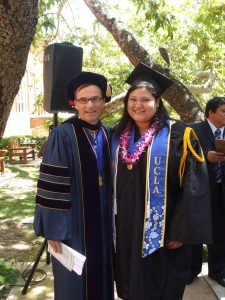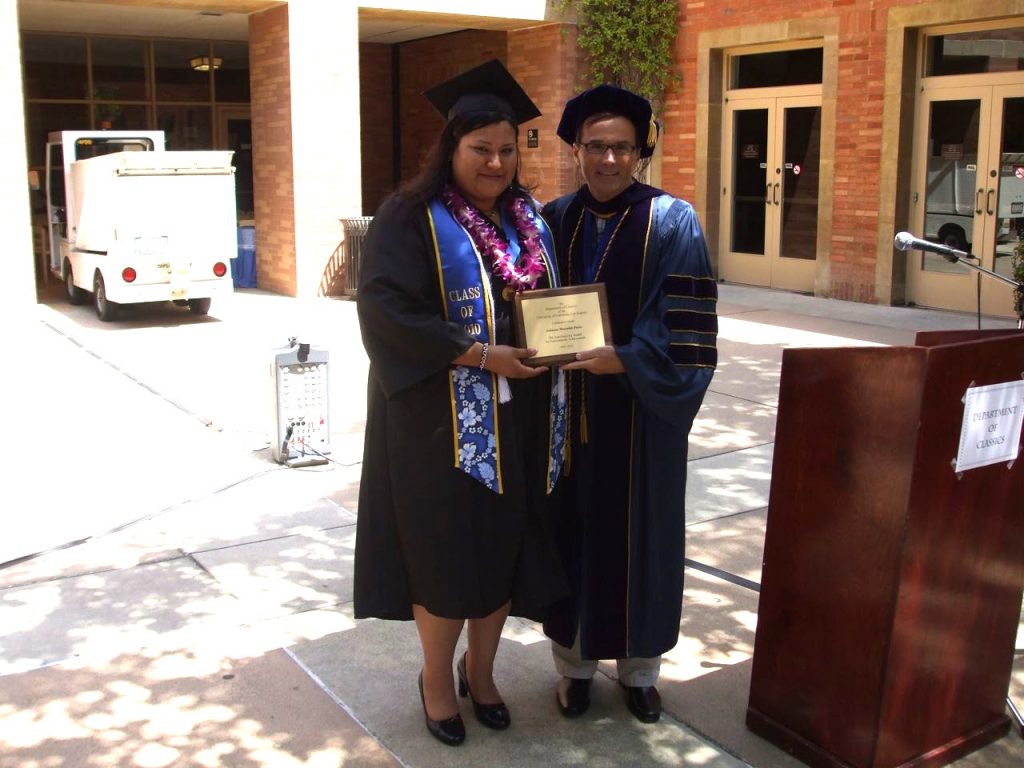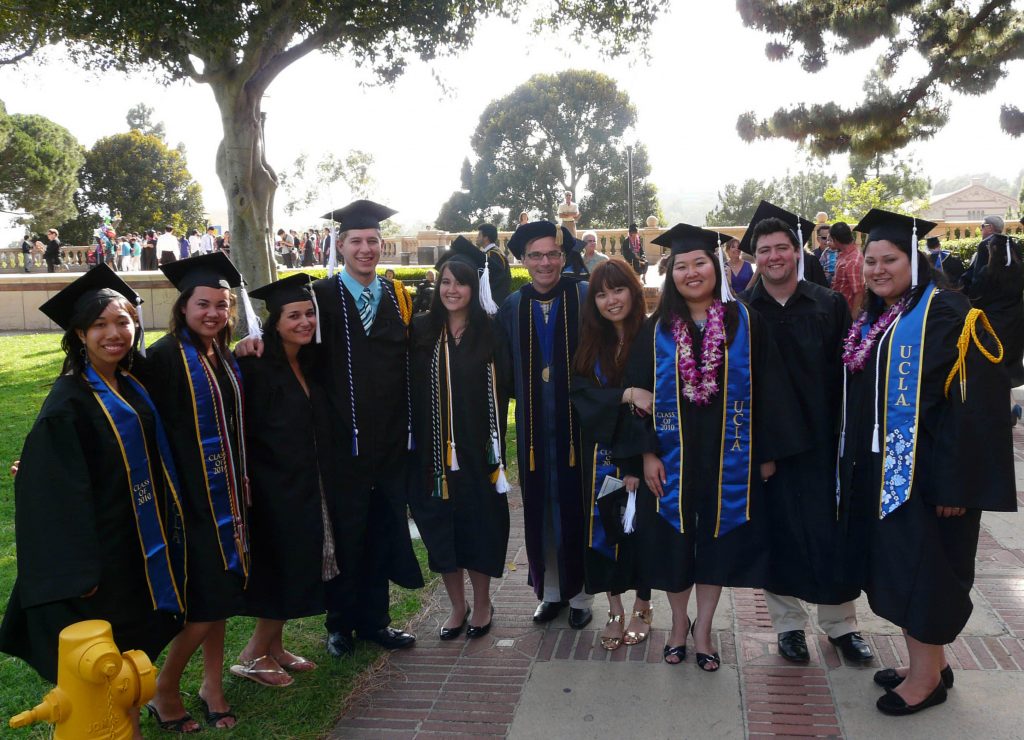In Memoriam
Mortimer Chambers
(1927-2020)
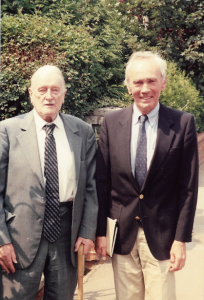
On December 14, 2020, the Classics Department lost its long-time friend and dear colleague, Professor Emeritus of History, Mortimer Chambers. Mort (to his friends) grew up in Saginaw, Michigan, received his undergraduate degree from Harvard (1947-49), went to Wadham College, Oxford as a Rhodes Scholar (1949-1952), and then returned to Harvard for his PhD, which he received in 1954 with a dissertation entitled “Studies in the Veracity of Thucydides.” Mort arrived at UCLA four years later and taught in the History Department for half a century from 1958 to 2010, introducing thousands of students to the history of ancient Greece and Rome. He was a versatile scholar whose work ranged from groundbreaking analysis of the Aristotelian Constitution of the Athenians (in 1962), to editing the Hellenica Oxyrhynchia for the Teubner series, to a crucial study on the dating significance of the three-barred sigma. This latter research changed the interpretation of the epigraphic evidence for the history of the Athenian empire in the 5th century B.C.E. Until Mort and his collaborators brought modern laser technology to bear on a battered inscription, the scholarly orthodoxy was that all inscriptions with a sigma written with 3 bars (rather than 4) had to be dated before 446 B.C.E. The full argument is too long to reproduce, but the results of overturning the consensus were crucial. Mort was revealed as a dogged pursuer of the truth in the face of opposition and a flexible scholar unafraid to rethink old paradigms. In the later part of his career he worked energetically on the history of classical scholarship, and published an important edition of Lorenzo Valla’s Latin translation of Thucydides (composed in 1448-52). As a reviewer noted, this was a labor that placed all serious students of Thucydides in Mort’s debt. Upon his retirement he was presented with a Festschrift, Text and Tradition: Studies in Greek History and Historiography in Honor of Mortimer Chambers by devoted students and colleagues.
His undergraduate lectures were legendary, and it comes as no surprise that his textbook, The Western Experience, went through ten editions and was a staple of Western Civilization courses in the US for decades. At UCLA he was particularly famous for his presentation of the episode of Hippocleides from the Histories of Herodotus. Here, the young Athenian aristocrat Hippocleides woos the daughter of the tyrant of Sikyon. All goes well until one night he has too much to drink, starts dancing, does a headstand on a table (exposing parts of himself not usually seen in such a context), and waggles his legs in the air. “You have danced away your marriage,” says the tyrant. The reply? “Hippocleides doesn’t care” (it became proverbial). At the beginning of the lecture Mort would place a cushion on the floor. General puzzlement (except for those in the know—and by the end of his career these were many: admirers would come to campus especially for this). As the story commenced, Mort would walk to the cushion, do a perfect headstand, and finish the story upside down, waving his legs in the air. Wild applause! No one ever forgot this class.
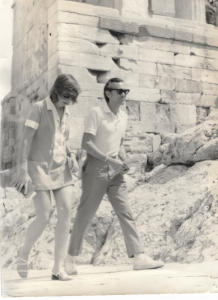
Mort’s activities were not, of course, confined to Westwood. From 1976 to 1978 he served as Director of UC’s Education Abroad Program in Göttingen, Germany. He was also a member of the Managing Committee of the American School of Classical Studies at Athens, and in 1979-1980 he was the Whitehead Visiting Professor at the School. In the 1990s, Mort created and taught a Summer Session course in Greece for undergraduates. Accompanied by his beloved wife, Catherine, he shepherded hundreds of eager students through Greece and the Aegean. He was also a wildly popular lecturer on Swan’s Tours and UCLA Alumni Tours in the Aegean and broader Mediterranean. He was one of those speakers who could jot down notes on an index card over lunch and then two hours later deliver a polished lecture that would reveal to the lucky audience the richness and importance of the classical past and its reception.
Ex-student Stanley Burstein, now Professor Emeritus of History at CSULA, writes: “Thousands of students over half a century can testify that Mort was also a master teacher. And a demanding one. For students fresh out of high school or lower division, the first encounter with Bury’s History of Greece —thick as a Bible with microscopic print—was a shock, but the rewards were also great. His lower division Western Civilization and upper division classes in Greek history regularly enrolled hundreds of students, attracted by his dynamic lectures and his legendary re-enactment of Hippocleides. His teaching did not stop at the classroom door, however. His office was usually open. If for some reason, the door was closed, a knock brought a gruff “herein,” and a warm welcome. Once inside, the timid freshman asking for help in locating a translation of an obscure text, the senior working on his honor’s thesis, and the graduate student struggling with his thesis could all expect generous help and good advice, whether it was about the importance of languages for ancient historians or what books to read or buy. Papers were read carefully with frequent references to one of Mort’s favorite books, Fowler’s Modern English Usage. In later years, Mort was a friendly presence at meetings of the Southern California Friends of Ancient History, welcoming young faculty and graduate students new to the area.”
Back at home Mort was a devotee of baseball, tennis, and college basketball (for many years he held season tickets to UCLA basketball, and Lew Alcindor, later, known as Kareem Abdul Jabbar was once a student). He regularly played tennis with colleagues and friends. He loved classical music, having started to collect records [78s!] when he was a teenager. His was a discerning palate, honed by years of travel in Europe and America. He introduced many friends to the refined delights of old Bordeaux, and the Bel-Air home he shared with Catherine was often filled with the laughter and pleasure of his guests. His hospitality was renowned and his friendship sure. He was adored by students and friends worldwide. He is sorely missed.
Philip Levine
(1922-2018)
The Department sadly announces the death of Professor of Classics Emeritus, Philip Levine. He passed away on Sunday, November 25, 2018 at the age of 96.
Philip Levine was born on September 8, 1922, the youngest of three children, in Lawrence, Mass achusetts. His parents, Samuel Levine and Jennie Dekark Levine, were Jewish immigrants from Russia who later met and married in the United States. He attended Lawrence High School, where most of its graduates worked in the local mills. He grew up deeply religious and very poor, a child of the Great Depression. Hard work and education became his salvation. Harvard and UCLA were the two mainstays of his long and rich life. He graduated from Harvard University (the only school to which he applied, and, he admitted years later, mostly because of its proximity to home) with an A.B. in Classics, Phi Beta Kappa. The outbreak of the Second World War interrupted his education, and after three years of service in Military Intelligence as an interrogator in Europe (1943-46), he earned his degree. Originally intending to study Mathematics, he found his passion inspired by his Greek teacher, the renowned classicist Werner Jaeger. He later earned his A.M. (1948) and Ph.D. (1952) in Classics also at Harvard University.
achusetts. His parents, Samuel Levine and Jennie Dekark Levine, were Jewish immigrants from Russia who later met and married in the United States. He attended Lawrence High School, where most of its graduates worked in the local mills. He grew up deeply religious and very poor, a child of the Great Depression. Hard work and education became his salvation. Harvard and UCLA were the two mainstays of his long and rich life. He graduated from Harvard University (the only school to which he applied, and, he admitted years later, mostly because of its proximity to home) with an A.B. in Classics, Phi Beta Kappa. The outbreak of the Second World War interrupted his education, and after three years of service in Military Intelligence as an interrogator in Europe (1943-46), he earned his degree. Originally intending to study Mathematics, he found his passion inspired by his Greek teacher, the renowned classicist Werner Jaeger. He later earned his A.M. (1948) and Ph.D. (1952) in Classics also at Harvard University.
He taught at Harvard University for seven years and The University of Texas at Austin for two before coming to UCLA in 1961 as an Associate Professor. Promoted to Full Professor soon afterwards, he was the Chair of the Department of Classics twice and Dean for the Division of the Humanities, College of Letters and Science (1965-1983). While Dean, he continued to think of himself first and foremost as a faculty member serving in an administrative capacity only in the interests of the larger academic community. In fact, throughout his career, he was a strong proponent of shared governance and a stout defender of the faculty voice in university affairs. Appointed to his position by Chancellor Franklin D. Murphy, he often later remarked on the incredible will of the university at that time to expand and set no limits on its goals and aspirations. During his long tenure committed to administrative service as Dean, UCLA grew to become one of the nation’s top-ranked research universities, gaining a well-respected reputation in the Humanities, and especially in foreign languages.
Among his academic honors, Professor Levine was a Guggenheim Fellow and Fulbright Research Scholar in Italy (1957-58). He received the Bromberg Award for the Humanities, Cavaliere dell’Ordine al Merito della Repubblica Italiana, and an honorary Doctor of Hebrew Letters from the University of Judaism. He was also the John and Penelope Biggs Resident in the Classics at Washington University. In 1998, he received the Emeritus of the Year at UCLA, perhaps one of his proudest moments, for recognition of his continued service in what he joyfully deemed “the blissful state of emeritude.”

His primary research was in the field of paleography and philology. His Harvard dissertation focused on the calligraphy of late antique and medieval manuscripts found in the northern Italian town of Vercelli. His own photographic facsimiles of these manuscripts have been kept by the Department. While a Fulbright Scholar he also inspected manuscripts in the Vatican Library collection. He published articles on a range of authors from Lucretius to St. Gregory of Nyssa in Harvard Studies in Classical Philology, California Studies in Classical Antiquity, Speculum, and Maia. A longtime project was an edition of Dionysius Exiguus’ translation of St. Gregory’s περὶ κατασκευῆς ἀνθρώπου (De conditione hominis) which produced, as one colleague notes, fascinating published observations on Dionysius’ prose-rhythmical technique. He was the translator of the Loeb Classical Library edition of St. Augustine, City of God, Books 12-15 as well as the editor of the popular Twayne editions on the Roman writers, Quintilian, Horace, Petronius, Seneca, Perseus, Terence, and Augustine.
Latin remained a great passion throughout his life, as he read, translated and taught the ancient pagan and Christian authors. After his service as Dean, he returned with much enthusiasm to full-time teaching (Deans at that time often continued to hold half or partial teaching loads). Courses on the lyric poets Catullus and Horace and Latin Prose Composition (this last the bane of many undergraduates and graduates alike) were his particular delight. He was much loved by students for his kindness and good humor even when explaining supines and periphrastic constructions. While an instructor at Harvard, he started his practice of keeping 3×5 enrollment cards for every student he taught in a Greek or Latin course, asking them at the start of class to inscribe their name, address and previous coursework. Years later, when several of these former students became distinguished scholars and lectured at UCLA, he gleefully brought out his old file cards and reminded them of their undergraduate years (and sometimes grades!). He also took a keen interest in the Department’s graduate program, which started to offer Ph.D.’s only a few years after his arrival at UCLA. He worked tirelessly in an effort to redesign the program to bring it into line with changing conditions and changing needs. Indeed, the central features of the UCLA M.A. program in Classics today, the survey courses in Greek and Latin literature and the prose composition requirements, followed the basic principles he first outlined to the Department in the early 1980s.
Colleagues fondly recall how as professor and Dean, he always enjoyed to play with dialect and accents. He maintained with a smile that he spoke Piedmontese, learned during his time conducting research in Vercelli, rather than Italian. He grew up speaking only Yiddish at home until chastised by an elementary school teacher at Lawrence. He continued to speak Yiddish throughout his life, warding off bad omens by the phrase ‘pfui daibel’ and affectionately calling a junior colleague, ‘Daivid’ (vowel pronounced as in ‘die’). Another colleague still remembers when he first arrived at the Department that Dean Levine was the first classicist that he ever heard to know and exchange words in Yiddish. As a senior member of the Department, he often tried to make new faculty feel welcome and introduce them to local restaurants in Westwood and his Beverly Hills neighborhood, which had been his home since he arrived at UCLA.
During his years at UCLA, the Department of Classics changed homes thrice. As one of the founding departments, Classics (originally Latin) held offices in the first building on campus, the Italian Romanesque Royce Hall before moving to Bunche Hall in the 1960s, widely disparaged at the time for its architecture and “waffle” windows. The physical move, advocated by Dean Levine not without some regret, also represented a growing shift in the field of Classics from Humanities to the Social Sciences. Later, in his retirement years, the Department relocated to Dodd Hall, where keeping an office, he regularly came to campus (and his beloved Faculty Center) and met a new generation of classicists. The jovial wit and charm of Professor Levine resounded in all those buildings, and has been sadly missed by colleagues, students and staff who knew him. He was preceded in death by his loving wife of 32 years, Dorothy ‘Dinnie’ Moseson Levine. He is survived by his sons, Jared (Lucy) Levine and Harlan (Tracy) Levine, both graduates of Harvard University like their proud father, and his four grandchildren Zachary, Zane, Zoe and Hannah. The transcripts for his interviews for the UCLA Oral History Project (made in January-March 1998) may be found in the Special Collections, Young Research Library.
Donations in his name can be made online to the City of Hope or by mail at City of Hope, Office of Philanthropy, 1500 E. Duarte Rd. Duarte CA 91010 (memo line: in memory of Philip Levine).
Ann Bergren
(1942-2018)
The Department sadly announces the passing of Professor Emerita Ann L.T. Bergren. Ann died suddenly at her home in Venice on May 10, 2018. She is survived by her son and his wife, Taylor Bergren-Chrisman and Erin O’Connor, and grandchildren Foxberg and Otto Chrisman. There will be a private family service in Brooklyn, New York. The Department and family will celebrate her life at a special occasion in October. The Center for Hellenic Studies in Washington D.C. is also making plans to hold an academic event in her honor later this fall (Professors Gregory Nagy and Laura Slatkin, co-organizers). Further announcements will be posted on this website. As Ann was fond of saying, to be continued.
Ann was a member of the UCLA Classics Department since 1979, and the first woman tenured in the department. Her groundbreaking scholarship in Classics is well known, best represented by the collection of her essays spanning two decades, published by Harvard University Press in 2008, Weaving Truth. Essays on Language and the Female in Greek Thought. She earned a Master of Architecture I at the Graduate School of Design, Harvard University in 1999. She was a frequent teacher in the summer program at B.A.S.E. (Beijing Architectural Studio Enterprise) in the Caochangdi District, Beijing. At the invitation of the Pritzker Award-winning architect Wang Shu, Ann recently gave a series of lectures on her project on the Liu Garden in Suzhou at the prestigious China Academy of Art in Hangzhou, China.
At UCLA Ann’s remarkable Classics work in the classroom won her in 1988 the University’s Distinguished Teaching Award, as well as the Award for Excellence in the Teaching of Classics of the American Philological Association. She also taught at the Southern California Institute of Architecture and, eventually, began to teach a wholly original course on contemporary architecture in L.A. to eager students in the UCLA Honors Collegium.
Ann was, in teaching, scholarship and friendship, extraordinary. She will be missed by all who knew her.
Robert Gurval and David Blank
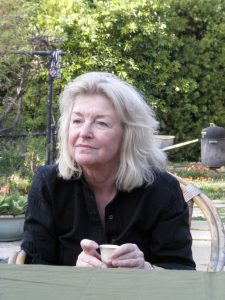
This photo was taken by Professor Hui-shu Lee, UCLA Department of Art History, 2010
To view as a PDF, please click here.
Calvert Watkins
(1933-2013)

Calvert Watkins, Distinguished Professor in Residence of the Department of Classics and the Program in Indo-European Studies at UCLA, died at his home on March 20, 2013. He had retired from his position as Victor S. Thomas Professor of Linguistics and the Classics at Harvard University in 2003, moving to Los Angeles and to UCLA when his wife Stephanie Jamison accepted a professorship in Indo-Iranian in the Department of Asian Languages and Cultures.
A dominant figure in Indo-European studies and historical linguistics, Professor Watkins played a leading role in meeting the challenge of revising the received model of Proto-Indo-European to incorporate the facts of Hittite and Tocharian, whose evidence was discovered only in the early twentieth century and was still not fully appreciated until his pioneering efforts of the 1960s. While he is particularly famous for his revolutionary analysis of the Indo-European verb, he made equally trailblazing contributions to the study of Indo-European nominal morphology and syntax. Working out the relationship of Hittite (Anatolian), Tocharian, and also Italic and Celtic to the rest of the family further led him to reexamine several broad issues of methodology in historical linguistics.
As he himself expressed it in characteristically plain language, his interest in prehistoric and early Indo-European speakers also vitally included “not only how they talked, but what they talked about.” Hence his career-long devotion to the study of “Wörter und Sachen”, mythology, and poetics, culminating (but not ending) in How to Kill a Dragon. Aspects of Indo-European Poetics (1995), a book both epochal and sui generis. This aspect of his scholarship had particular resonance for the Program in Indo-European Studies, which from its founding has championed a holistic approach to the study of Indo-European language, culture, and society.
Cal Watkins continued his scholarly activities in his decade at UCLA, during which he made multiple presentations at the East Coast Indo-European Conference as well as at international conferences in Kyoto (2007) and Cologne (2012). A version of the last-cited paper, “Aspects of the ‘Expressive Dimension’ in Indo-European: Toward a Comparative Grammar of Speech Registers” (likewise presented in a French version in Paris), was also read at the 24th UCLA Indo-European Conference last fall and will appear in the forthcoming proceedings. Other recent scholarly publications are listed in the bibliography in Selected Writings. Volume III: Publications 1992-2008, ed. by Lisi Oliver (Innsbruck 2008). He recently supervised the third revised edition of the widely admired American Heritage Dictionary of Indo-European Roots (2011), which also contains his essay “Indo-European and the Indo-Europeans” that so masterfully introduced our discipline to the general public. His many contributions to PIES include teaching a memorable version of Classics 250, “Greek Epigraphic Verse” (Spring 2005), notes and handouts of which continue to be used, and stepping in on short notice to teach an Introduction to Tocharian. He regularly served as a second reader on qualifying examinations and as a member of dissertation committees (at least half a dozen, including two current), and mentoring graduate students carrying out both summer and academic-year research projects (one ongoing). He was looking forward (as were we) to his imminent service on two more dissertation committees. His unique expertise and discerning judgment will be sorely missed in all of these areas. His unusually broad intellectual curiosity remained undiminished, and he further enjoyed attendance at meetings of the American Oriental Society, at lectures in UCLA Classics and Linguistics, and participation (and occasional presentations) in Pamela Munro’s seminar in American Indian Linguistics, and periodic meetings of the informal “Anatolian Club” at the home of Jaan and Madli Puhvel.
Recent and current UCLA graduate students met the same Cal Watkins that others of us knew from decades before. He held firm and well-formed views and did not suffer fools gladly, but he had no truck with dogma or doctrine and emphatically never presented his own analyses in such terms. Those of us fortunate enough to have been his students can attest that in his teaching he never emphasized facts (most of those we were expected to learn on our own from reading and listening), but rather how to become a practicing scholar: how to read a text, how to identify a problem, how to recognize (and formulate) an argument. His preferred way to teach these skills was by example and by “on-the-job training”, in which we ourselves tried, received patient and constructive criticism, and tried again, with the cycle repeated until we achieved some modicum of success. The abiding relevance of his ideas is manifest in the references and acknowledgements sprinkled through our work (and that of others in multiple disciplines). His personal legacy lies deeper: in teaching us how to think—as Indo-Europeanists, as linguists, as humanists.
The preceding lines have focused on Calvert Watkins as preeminent scholar and unexcelled teacher. We authors of this all too brief remembrance may be permitted to close with memories of his qualities as a human being: warmth, openness, utter lack of pretension, genuine interest in and respect for his interlocutor (regardless of station), rich sense of humor, and irrepressible joie de vivre. Also in this regard those who came to know him only in his last years here at UCLA experienced the very same person as those of us who met him three or four decades before. The same man who in the fall of 1967 greeted a new and very raw Harvard graduate student with a hearty handshake and the words “Hi, I’m Cal Watkins!” chatted amiably with current and prospective UCLA graduate students in Indo-European and Classics in his very last public appearances in March 2013.
His scholarly ideas will live on, duly transmogrified as he not only foresaw, but also welcomed. His teaching will likewise be faithfully passed down by his academic “progeny,” as he vouchsafed us the wisdom of his own teachers. What remains inimitable and irreplaceable is that twinkle in the eye, that wry smile, and that unmistakable inflection of voice…
We will not see his like again.
Craig Melchert and Brent Vine
April 2013
For other remembrances, see the Harvard Gazette Obiturary and the essay by Joshua Katz in the Daily Princetonian.
Julianna M. Pazos
We have posted here some photos of Julianna on her graduation day in remembrance of her bright sprit and outstanding accomplishments. The quotation from C. S. Lewis is one that she herself found solace in at the time of her graduation, as she looked toward the future after suffering through the untimely death of her own mother just months before.
“Every day in a life fills the whole life with expectations and memory.”
-C.S. Lewis


